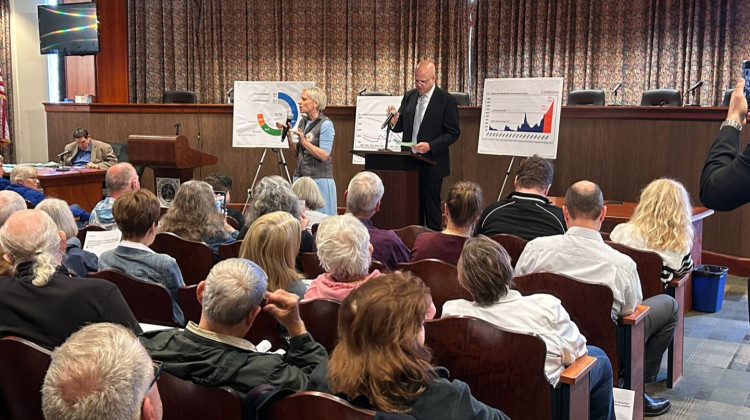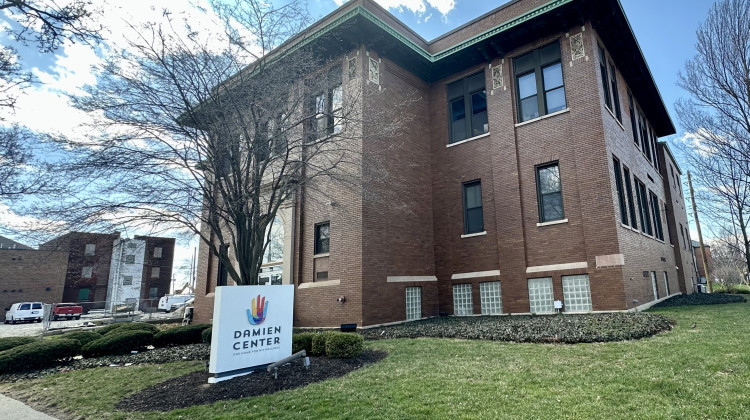INDIANAPOLIS (AP) — More than 1 million Indiana voters requested early ballots this fall amid worries about the coronavirus, a record number but still lower than officials initially projected.
The Indiana secretary of state’s office, which oversees state election policy, said 559,749 absentee by-mail ballots were requested across the state as of Friday, and 530,854 voters have voted at an early voting location. Thursday was the deadline for requesting a ballot.
In the 2020 primary election, a total of 640,225 Hoosiers voted absentee in-person or by-mail. In 2016, during the entire period of absentee voting for both in-person and by-mail, 977,239 ballots were submitted.
Officials were bracing in August, however, for perhaps 10 times more mail-in ballots for this fall’s election than four years ago, expecting that some 1.3 million to 1.8 million ballots would be mailed. That's equivalent to more than half of Indiana’s voters choosing that option rather than heading to polling sites on Election Day.
“Hoosiers are eager to vote and are voting early in record numbers to make sure their voice is heard,” Republican Secretary of State Connie Lawson said in a statement Thursday. “Election officials across Indiana have worked tirelessly to make sure each voter is safe and secure, and I’m pleased to see this level of turnout heading into Election Day.”
Republican Gov. Eric Holcomb and other GOP leaders turned aside calls from Democrats and others to lift Indiana’s mail-in voting limits, which allow people to vote by mail only if they fall into one of several categories, including being 65 or older or being absent from their home counties on Election Day.
Voting rights groups Common Cause Indiana and Indiana Vote By Mail have separately sued the state over the mail-in balloting limits, as well as the deadline for ballots to arrive in election offices.
A federal appeals court rejected one of lawsuits earlier this month that aimed to make mail-in ballots available to all Indiana voters for the November election because of the coronavirus pandemic. State officials have discretion in how to allow mail voting, according to the ruling, and voters not wanting to cast ballots on Election Day can go to early voting sites for nearly a month before then.
“We’ve long been frustrated that Indiana has been at the bottom in terms of voter turnout, and that's in part because the state has put up so many of these barriers," said Julia Vaughn, policy director for Common Cause Indiana. “But we're still feeling very hopeful. Hoosiers are coming out in large numbers already.”
A separate federal appeals court decision Oct. 13 additionally determined that the record number of Indiana residents voting by mail this fall will still have return their ballots in time to meet a noon Election Day deadline to be counted.
A judge had cited slow mail delivery because of the coronavirus as a reason for extending the count if ballots were postmarked by Nov. 3. But the appeals court, in a 3-0 opinion, overturned the decision and said Indiana’s noon rule still stands.
Indiana Democratic Party spokesperson Phil Johnson said refusal by state leaders to expand mail-in and absentee voting, especially during the COVID-19 pandemic, is “a missed opportunity," adding that Democrats are now focusing on educating voters how to vote with the options available as election day nears.
“We want people to vote safely and securely,” he said. “We want everyone to get their ballots in.”
The secretary of state’s office warned Thursday, though, that the increased volume of absentee ballots could delay final election results beyond election night. Johnson said a delay is “understandable” given the record numbers of early ballots, but that transparency will be key when votes are being counted.
Casey Smith is a corps member for the Associated Press/Report for America Statehouse News Initiative. Report for America is a nonprofit national service program that places journalists in local newsrooms to report on undercovered issues.
 DONATE
DONATE







 Support WFYI. We can't do it without you.
Support WFYI. We can't do it without you.